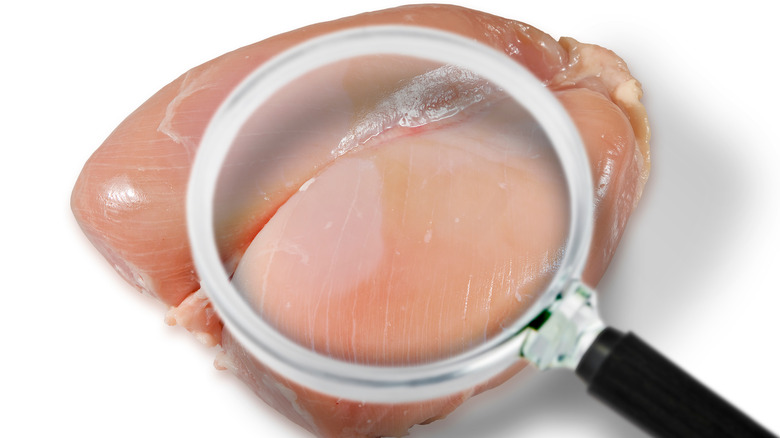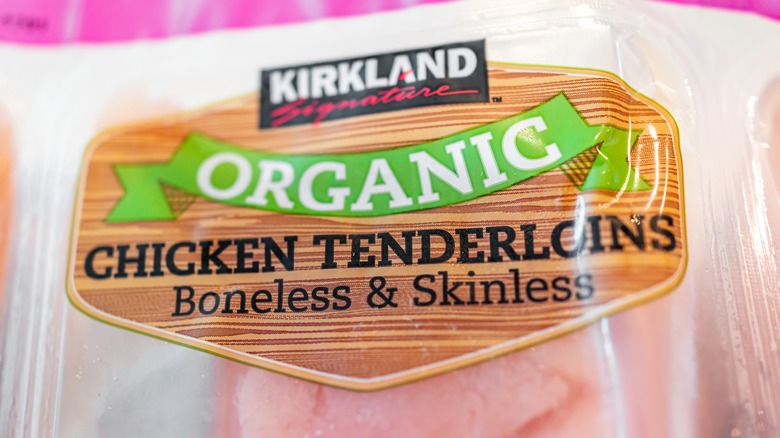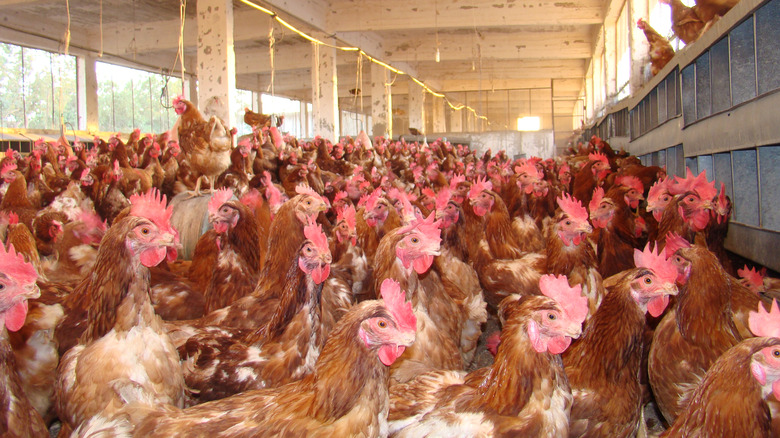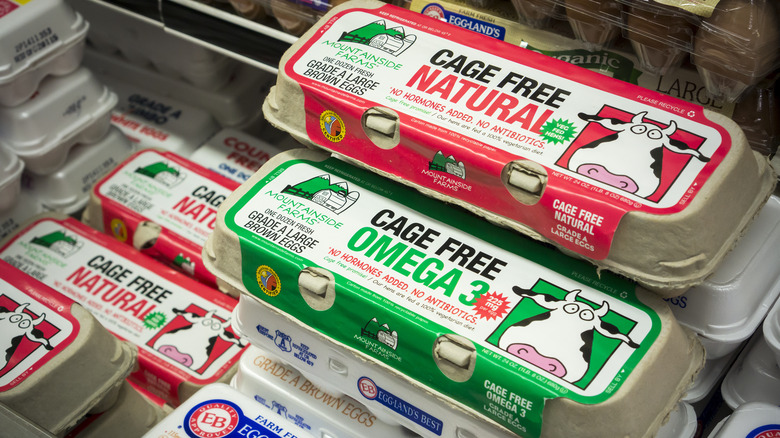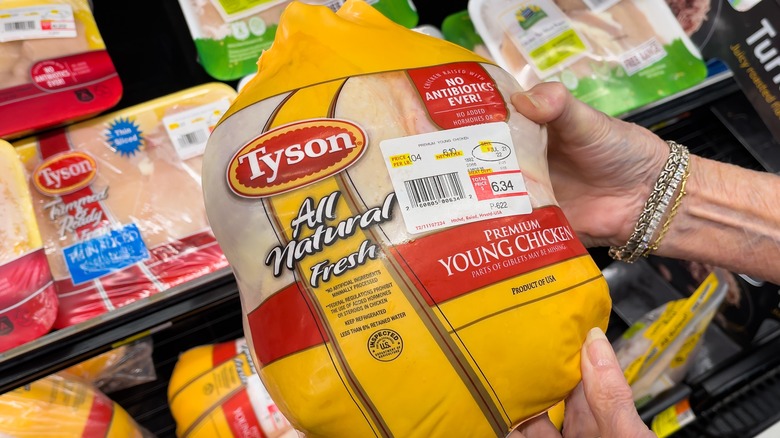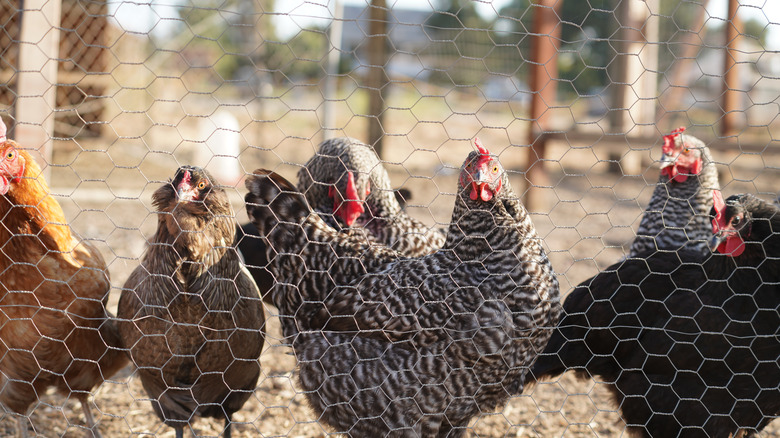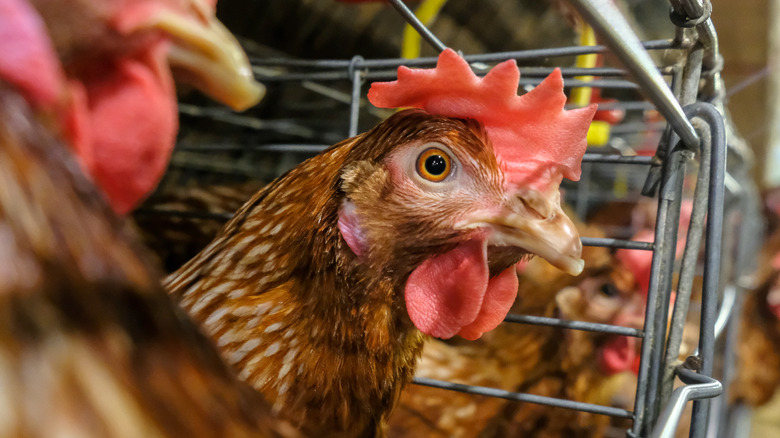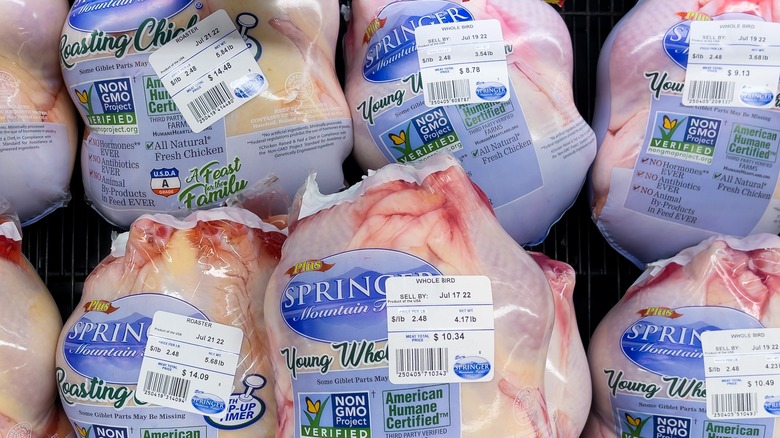What Grocery Store Chicken Labels Really Mean
Chicken is the world's most widely consumed meat; nearly 118 tons were consumed in 2019 alone. The United States is also one of the biggest chicken producers globally, outpacing meatpacking superpowers like China. The meat is a staple in all types of American cuisine, from everything to tailgate-ready wings to Southern fried chicken. But is all chicken created equal?
Consumers don't seem to think so. There are many different labels on chicken that you can find at the grocery store ranging from "organic" to "antibiotic-free." These claims feed into consumer concerns about the ethical production practices of their poultry — including questions about how the animal was raised and what its diet consisted of. The chicken industry has fed into these queries, continuing to present claims on their products without any explanation as to what the claim means. In all of our quests to become more educated consumers, here are some of the most common labels you see on chicken products and what they actually mean.
Chicken grade
No, chicken grading doesn't happen when a hen gets an A+ on her spelling test. The United States Department of Agriculture chicken grades are part of an inspection process that assures that the meat being sold to consumers is both safe and of the highest quality possible. Once producers have passed an initial inspection via the USDA's Food Safety and Inspection Service (FSIS), grading is an optional step pursued by a different agency: the USDA's Agricultural Marketing Service (AMS). This voluntary program is paid for by the processor, compared to the mandatory inspection paid for via tax dollars.
All meat, including beef, pork, and chicken, is graded based on standards that evaluate a meat's shape, appearance, fat, and skin. Grade A poultry is the only grade available to purchase in a grocery store. To achieve this standard, the meat must not have any bruising, discoloration, or feathers. The overall appearance of the chicken must be "well-fleshed," meaning that it has a bright (appetizing) appearance.
What happens to the Grade B and C chicken? These are either sold to consumers as ungraded or are ground up and used in chicken products. Grade B chicken features fewer deformities than the latter, such as disjointed bones, while Grade C may have bones that are both disjointed and broken.
Organic
Although the USDA organic certification process has a bad rap, it is one of the most rigorous certifications and labeling processes of all the chicken labels you'll find in the store. There are many different terms on organic food labels, including "USDA Organic," "made with organic ingredients," and "organic." To receive the USDA Organic seal, the chicken must follow organic management practices from when it was a two-day-old chick to when it was slaughtered. Chickens can only be fed USDA organic-certified chicken feed without any hormones, animal byproducts, or prohibited additives. If the food is processed, such as breaded chicken nuggets, all of its ingredients must also follow USDA organic standards as well.
The chicken must also be kept in conditions that allow the bird to stand, move freely, and have direct access to clean and adequate bedding. This does not mean the birds are raised on pasture or have access to the outdoors. However, a proposed government ruling may change this standard by requiring producers to grant organic birds this provision.
Chicken products that are "made with organic ingredients" must contain at least 70% USDA-certified organic ingredients and none of the prohibited substances, such as genetically modified ingredients. These products cannot have the organic seal but can list the individual ingredients as organic. "Organic" foods must contain no more than 5% non-USDA-organic ingredients and can carry the organic seal.
Free-range
Free-range chicken may not mean what you think it does. According to the USDA's Agricultural Marketing Service, free-range hens should have unfettered food and water access as well as the ability to move around and "continuous access to the outdoors during their laying cycle." However, this standard does not define how much time the chickens spend outdoors or what this access even looks like. For some, this may be living outside 24/7, or it can be access to a door that leads to a small dirt patch that is insufficient for the number of birds it would theoretically need to support. Free-range chickens still suffer from the same plights as their caged brethren, including increased rates of sickness, stress, and poor quality of life.
Certain certifying organizations require a specific amount of space for free-range chickens to access, but this is not standard for all chicken products bearing the free-range label.
Cage-free
Cage-free is more often a label found on eggs rather than chicken because it describes how the layer hens are raised and kept. As the name implies, these birds are kept in open spaces rather than cages. Battery cages are typically smaller than a sheet of printer paper per bird, which can cause high levels of psychological stress and physical damage, manifesting as feather pecking and osteoporosis caused by limited movement.
Cage-free facilities, which may not allow the hens to access the outdoors at all during their life cycle, vary in how much enrichment and "natural behavior" the hens experience. For example, some cage-free facilities are crammed with hens, allowing for very little movement. These farms also may put the birds under the same experiences as caged hens, including beak trimming (to prevent the birds from pecking one another to death), starvation to accelerate molting, and only providing access to artificial light. Cage-free farms can still be factory farms.
Antibiotic-free chicken
"Chicken raised without antibiotics" is a common claim in poultry commercials and on labels. A 2019 study by Consumer Reports revealed that a third of consumers often buy meat with a "no antibiotics" claim, indicating that this standard is important to some shoppers. The phrase "raised without antibiotics" means that the bird was not treated with antibiotics throughout its lifecycle. Birds that need antibiotics are separated from the rest of the birds to prevent cross-contact, and producers are required to support this claim, but no inspections are required. However, the producer must submit to inspection if the label has a USDA Processed Verified seal.
There is also a claim of"no medically important antibiotics," which means that antibiotics used to treat humans were not given to the animal. Some companies will also selectively choose which kinds of antibiotics can be given to the birds, such as only allowing antibiotics intended for disease prevention.
Why are antibiotics an issue in livestock agriculture? Bacteria can develop resistance to these antibiotics with prolonged use, which increases the risk of exposure to humans through eating affected meat or coming in contact with animal feces. Not only does bacterial resistance cost significant amounts of money to fight, but it can also lead to sickness and death in the affected human population.
No hormones or steroids added
Hormone and steroid use in chickens was banned in the 1950s, so why do companies still make the claim that their chicken is "hormone-free?" It may be because growth hormones are still legally allowed in beef cattle, often in the form of a hormonal implant that increases the growth rate of the cow when it's in a feedlot. Chickens cannot be given growth hormones because if the bird were administered a protein growth hormone via its feed, it would break down during digestion and not work. Instead, the chickens would have to be injected with a steroid several times a day to have any efficacy. For almost all factory farms, catching, recording, and administering these hormones just isn't feasible.
The reality is that selective breeding has allowed chickens to grow big without the use of synthetic growth hormones. If a farm were to administer hormones, it would cause freakish growth in the bird, eventually crippling and killing it. In short, it's not a wise financial decision.
Natural
The USDA regulates companies to use "natural" to describe meat that does not contain artificial ingredients, colors, or preservatives and undergoes minimal processing. Along with this claim, the company must describe why that claim is used, either directly below the claim or with an asterisk.
There are some important caveats to this claim. Even if "natural" is a legally-regulated statement, there is no third-party certifier to indicate whether it is true. In addition, the claim applies only to meat after processing, meaning that "all-natural" chicken may have been fed food with antibiotics or raised in conditions that are far from "natural," such as in cages or without access to the outdoors. All fresh meat, including non-organic, is eligible for this distinction. Therefore, "natural" is one of the most misleading claims about chicken products and should be carefully evaluated by consumers before purchasing.
Pasture-raised
Pasture-raised — now we're getting somewhere. If you want to buy chicken (based on a label alone, of course) that has the best quality of life, you'll want to select pasture-raised chicken. USDA standards require these birds to have at least 20% of their diet come from foraging on pasture, including grubs, insects, and living plants — which is "natural" for an omnivorous chicken. The remainder of the feed is supplemented with grain, which allows the bird to come up to market weight within a reasonable time.
Because the birds are raised on a less intensive diet, the qualities of their flesh differ from solely grain-fed chicken. Pasture-raised meat tends to have slightly less fat and is thus better for roasting or grilling rather than sautéing. The birds also take longer to reach slaughter weight, so pasture-raised meat tends to be less dense than conventionally-raised chicken.
Naturally-raised
If you see chicken labeled "naturally raised," proceed with caution. This term, although often used synonymously with "natural," can only be marketed on live animals, not meat products. The three components of this standard, which the USDA governs, ensure "no growth promotants were administered, no antibiotics (other than ionophores used to prevent parasitism) were administered, and no animal by-products were fed to the animals." Therefore, naturally raised refers more to the process by which the animal undergoes while it's living, while natural only refers to if the food was adulterated after the animal was slaughtered.
Rarely is chicken marketed as "green," but labels like "sustainable" may rear their ugly head on chicken packaging. Both of these terms are unregulated and have no backing via a third-party certifier. Companies can add these claims without having to go through any sort of inspection or standards. More specific sustainability claims, such as "biodegradable" and "made with renewable energy" on certain non-food products, are regulated by the Federal Trade Commission, but the agency does not regulate the marketing of food products like packaged chicken.
Animal Welfare Approved
A Greener World (AGW) is an independent, third-party certifier that administers the "Animal Welfare Approved" (AWA) certification on meat and meat products. For a chicken to receive this certification, the animal must be raised on pasture for its entire life and under specific welfare standards. These standards are written in collaboration with veterinarians, scientists, and researchers to ensure that the animal's needs are met. Unlike other marketing claims, AGW performs annual audits for producers to ensure all stated practices are being performed.
Specific to meat birds, AGW's AWA certification prohibits the confinement or caging of birds. It also does not permit the "sub-therapeutic and/or non-therapeutic use of antibiotics, or any other medicines, to control or prevent disease or promote growth." This standard also prohibited any sort of mutilation of the birds, including beak trimming, de-clawing, and de-spurring. In addition, the birds cannot be fed any animal or animal-byproduct-based food, but AGW does make an exception for sustainably sourced fishmeal and aquatic-based food.
Humanely-Raised and Humane Certified
Certified Humane is another third-party certifying organization that examines the raising and slaughtering conditions of a variety of livestock, including chickens, beef, poultry, and pork. Its standards are based on the Royal Society for the Prevention of Cruelty to Animals (RSPCA) and are reinforced by a consortium of veterinarians and animal welfare professionals. Producers that utilize this label must adhere to annual audits to maintain their affiliation with the organization and to sell products with its label.
The standards are based on several fields, including access to nutritious feed, an appropriate growing environment, responsive veterinary care, and rigorous processing standards. The birds are not required to be raised on pasture or go outdoors, but the standards do enforce that the stocking density of the farm is low enough for birds to perform natural behaviors, like stretching their wings, and have access to some sort of enrichment tool to prevent adverse behaviors like pecking. The organization does certify some producers that are pasture-raised or free-range with a specific square footage per bird.
Non-GMO
It's important to remember that the chickens themselves are not genetically-modified (GM) animals. Instead, chicken breeds are selectively bred or cross-bred for their qualities. However, the food the birds are fed may contain genetically-modified ingredients.
According to the National Chicken Council, farmers have added genetically modified corn and oilseeds to livestock feed since 1996. Since nearly 80% of the United States' supply of these crops is genetically modified in some capacity, it's unreasonable to assume that genetically modified ingredients wouldn't be found in livestock feed. There has not been any scientific evidence of adverse animal health impacts or nutritional differences. Since the chicken itself is not genetically modified, producers are not required to list if it was fed genetically-modified feed.
There are some certifications that prohibit the use of genetically modified ingredients in chicken feeds, such as the USDA's organic certification. Organizations can also seek third-party certifications like the Non-GMO Project Verified seal.
Farm-raised
Chicken labeled "farm-raised" can be confusing — after all, where else would it come from? It's not uncommon to see this claim on chicken and eggs, and unsurprisingly, it doesn't have any sort of weight to it. All chickens are raised on farms, as are other livestock we eat.
Companies likely label their products as "farm-raised" to appeal to their customer base and assert that their farms are the idyllic American farm rather than just a factory with thousands of living animals inside of it. The reality of the American farming landscape is that a majority of farms are vertically integrated, meaning that a single firm owns hatcheries, processing plants, and every step in between. Rarely do commercial broiler production operations produce less than 100,000 birds in a year since the capital required for production incentivizes more extensive operations. This, in turn, means that the technology to produce chickens is highly advanced and far from the vision of happy hens dust-bathing and walking around a wooden barn.
Vegetarian diet
One of the common misconceptions people have about chickens is that they are natural herbivores. Backyard chicken keepers will feed their birds mealworms and insects as snacks — the birds will even eat a dead carcass or a whole frog if given a chance. So, why do so many brands tout that their chicken is "vegetarian-fed?"
Corn and soybeans allow the chicken to bulk up to market size quickly and cheaply. However, this diet causes methionine deficiency and forces the producer to add more synthetic materials back into the feed to keep the birds healthy. And since organizations like USDA Organic regulate what kinds of additives can be used in feeds, farmers often get stuck in a bind. Some folks have even gone as far as to argue that feeding a vegetarian diet is a form of cruelty in itself.
So what do non-vegetarian-fed chickens eat? These feeds can be comprised of various proteins, including fish meal, insect larvae, and blood or bone meal from other mammals. Scientists are working hard to develop sustainable protein sources for chicken feed like algae.
Locally-raised
You would expect "locally-raised" food to have a certain standard or distance that constitutes local, but this is nothing short of a pipe dream. Not only is the term "local" unregulated in food marketing, but it also varies based on what your definition of "local" is.
Local meat products are also hard to find in grocery stores and markets. This is because the USDA heavily regulates the slaughter process, and the majority of all slaughter plants in the United States are large-scale, highly mechanized, and only purchase birds from sellers that they have a contract with. These barriers, along with finding consumer markets with a high willingness to pay for locally-raised meat, mean that "local" farmers don't really have the financial incentive to grow livestock. However, the rise of mobile processing units and regulation changes allowing producers to ship across state lines has changed the local meat landscape significantly within the past decade.

